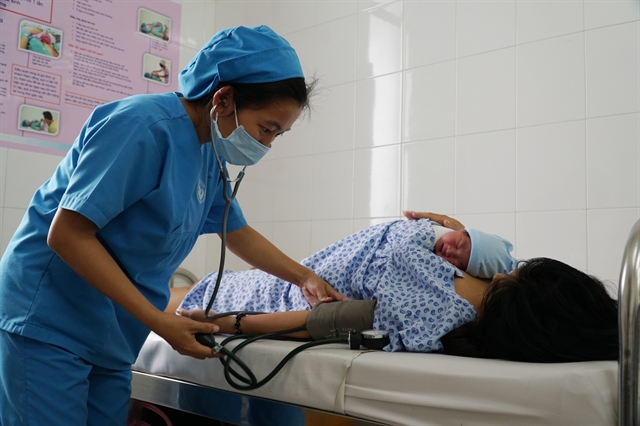 Society
Society

 |
A medical worker takes care of a mother and her newborn child. — VNA/VNS Photo Phương Vy
HÀ NỘI — While any mother can experience postpartum depression, a large number of cases went undiagnosed until they turned severe.
Doctors recommend that families should pay attention, provide care and seek prompt treatment to help mothers make a full recovery from the disorder.
Khánh (not her real name), a mother from Đắk Lắk Province started experiencing postpartum depression a month after giving birth.
She constantly stayed up at night to take care of her crying baby, and the limited breast milk supply had put her under even more pressure.
Khánh said: “At first I tried to talk to my husband, but he was so busy with his work that gradually I didn’t feel like talking about my problems anymore.
“I suffered in silence, and only a short while after that, I started to fear my child’s cry, I get upset for no reason, and sometimes I didn't even want to take care of my child.”
Seeing Khánh’s unstable mental state, her mother took her to the hospital. Her conditions gradually improved, and the negative thoughts started to recede with her husband and family members trying to share her burden.
Tiên (not her real name), another new mother in Quảng Bình Province, was in her third year of university when she was pregnant with her child and decided to halt her education.
To her family, Tiên was a joyful and friendly person. Yet a few weeks after her child was born, her mental state began to get worse.
While her pregnancy had been normal, she started experiencing insomnia after the delivery. This was followed by constant fatigue, increasing self-isolation and sensitivity.
Her family added that Tiên received little care and attention from her husband.
Things took a turn when Tiên tried to commit suicide by cutting open her stomach with a knife.
She was allowed home after receiving treatment for her physical wound and mental health state, but once again showed signs of instability – easily getting upset and refusing to take medications.
At the National Institute of Mental Health, Dr Nguyễn Thị Ái Vân said about Tiên’s case: “Through examination, doctors see that Tiên has severe depression with suicidal behaviours. She was also diagnosed with behavioural and mental disorders associated with pregnancy.
“After going under treatment at the hospital, she has become more cooperative and her mental state has become more stable. She actively talks to other people and her sleep and appetite have improved.”
According to Dr Vân this is one of the critical cases that were taken to the hospital by the patient’s family.
However, there are many more other mothers who show mild symptoms or intentionally hide their health condition, which leads to more severe cases.
There are also patients who experienced the symptoms of fatigue, insomnia, chest pain. These people then seek treatment in cardiology and neurology, which fails to identify the root cause.
According to Dr Nguyễn Văn Tuấn, director of the National Institute of Mental Health, the facility has admitted 27 mothers with postpartum mental health disorders, many cases with suicidal thoughts.
The institute is receiving around 250 to 300 patients per day, and twice as many during the pandemic. Up to 30 per cent of these patients seek treatment for depression and postpartum depression.
Dr Vũ Thy Cầm, head of the clinical psychology department at the institute said that for mothers, hormonal changes and the arrival of a new baby could bring emotional imbalance.
While symptoms of postpartum depression could appear within four weeks of delivery, many studies showed that the disorder could arise any moment within one year of childbirth.
In Việt Nam, statistics from obstetric hospitals reveal that the percentage of mothers experiencing postpartum depression falls between 11.6 and 33 per cent.
Up to 50 per cent of these cases are undiagnosed, making it more difficult to provide support and prevent them from turning severe.
Doctors said that around 80 per cent of women with these illnesses could make a full recovery if they receive adequate care and treatment, especially from their partner and family.
Dr Cầm said: “New mothers need to learn how to relax and ease their stress. They should not force themselves more than they can bear or expect themselves to be perfect mothers.
“After the delivery, they should make sure to get enough sleep. They could take a rest when their child is sleeping, take time for self-care and going out with their friends.
“New mothers who show signs of depression should seek treatment at psychology departments as soon as possible to receive a suitable treatment plan and avoid severe consequences.” — VNS





 Brandinfo
Brandinfo